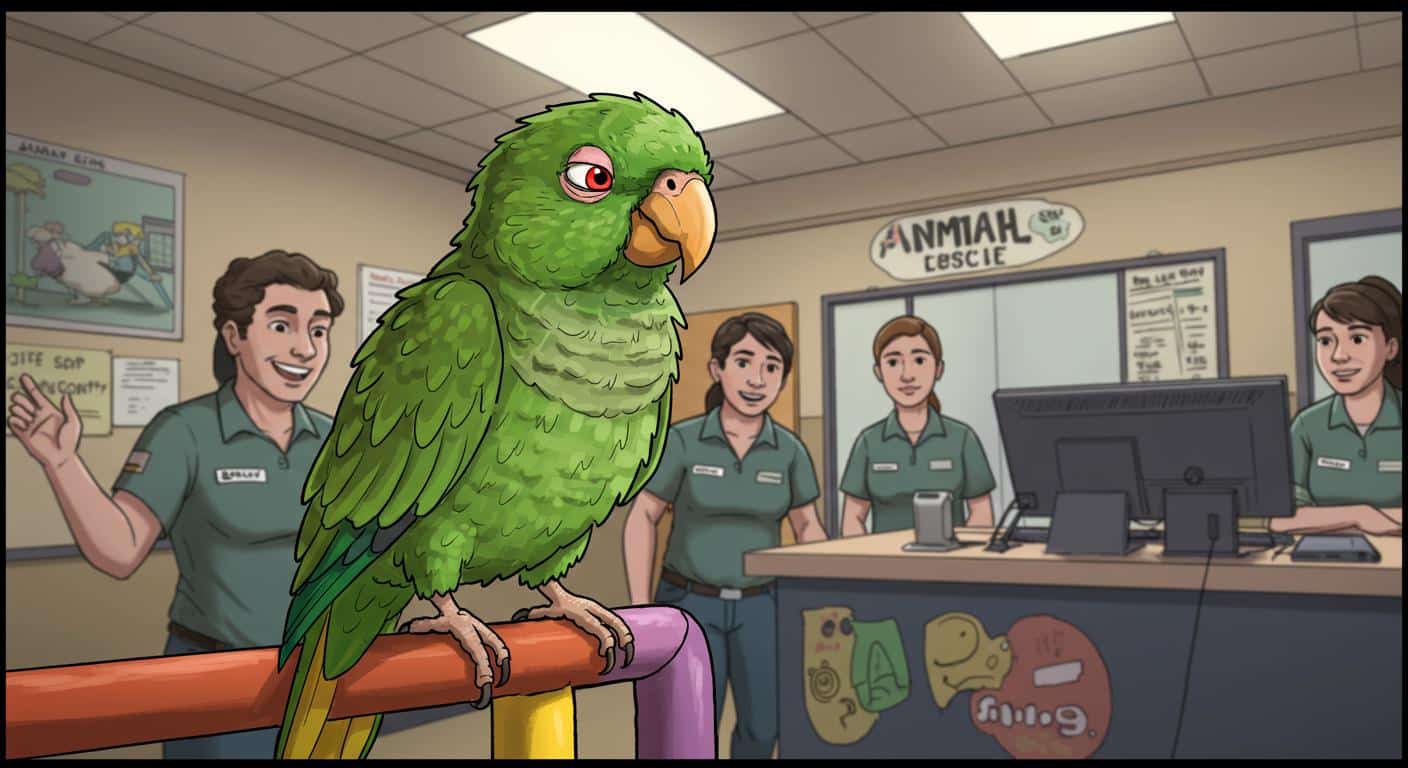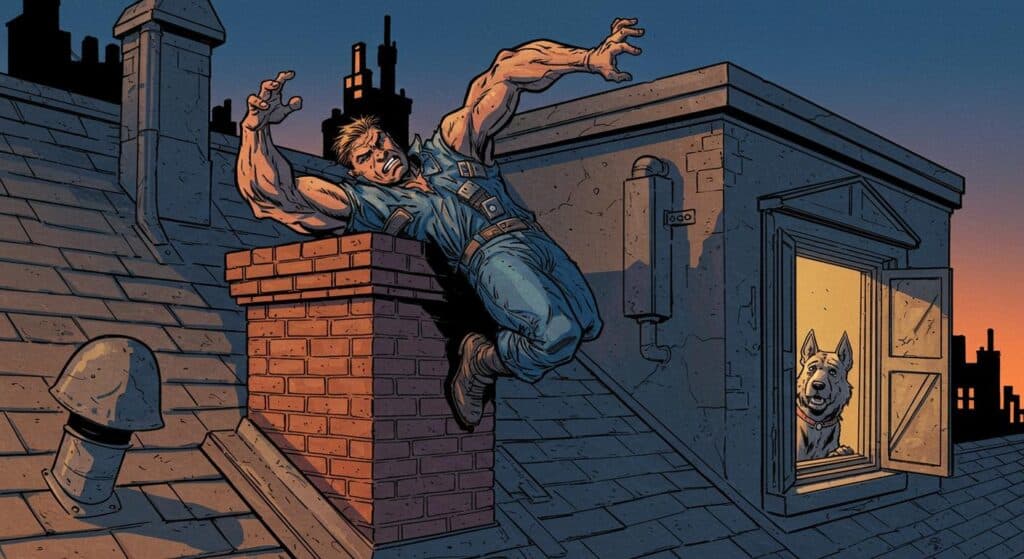Hendrix, a blue-and-gold macaw currently residing at Forever Paws Animal Shelter in Fall River, Massachusetts, is perhaps the quintessential example of what happens when animal rescue, human eccentricity, and internet humor converge. And yes, he swears like—well, a parrot who’s been paying especially close attention.
Partially Feathered, Fully Flamboyant
Taken in by Forever Paws after his previous owner of at least two decades was no longer able to care for him, Hendrix arrived in a state described as “mostly naked.” There’s some ambiguity about his age—the shelter’s Facebook post, referenced in NBC 10’s reporting, puts him at “about thirty,” while UPI’s coverage uses the rounder figure of twenty—but either way, it’s a significant stretch to live off a diet that, staff revealed, consisted largely of white bread, human cereal, animal crackers, and sunflower seeds. Unsurprisingly, this left Hendrix bereft of much of his rainbow finery. The shelter notes his condition is improving as proper nutrition slowly coaxes out new tufts of feathers—a small, fuzzy victory.
But feathers alone aren’t what’s earned Hendrix his viral status. It’s his “rated R” vocabulary, enthusiastically detailed by Chantelle Rogers, Forever Paws’ administrative assistant, in statements across both outlets. According to Rogers, Hendrix’s conversational skills are nothing if not eclectic: he’ll graciously say “thank you” for a treat or respond to “pretty bird” with the same, before pivoting into a torrent of curses, slurs, and a “what the hell?” delivered with unnerving contextual accuracy. His verbal repertoire is broad, but let’s just say it’s not what you’d want echoing through the halls at a children’s birthday party.
The Macaw That Launched a Thousand Comments
The shelter might have anticipated a bit of attention when it posted the now-famous adoption notice for Hendrix, but the honest, deadpan flavor of their warnings seemed to strike a nerve (or a funny bone) well beyond Fall River. In a flourish that typifies modern shelter candor, staff warned on Facebook—quoted in NBC 10’s account—that “If you adopt Hendrix, you’re basically adopting Samuel L. Jackson. This bird’s language is not for the faint of heart.” Most animal adoption profiles avoid references to arsenic or M.F.-ers (even in code), but this one let it fly.
The results: over 50 applications from places as far-flung as Kansas and Canada, thousands of social media interactions, and, as Rogers explained to WJAR, a global wave of both earnest and tongue-in-cheek offers to take the bird in. The shelter’s sense of humor is evident in their approach, but so is a textbook attention to disclosure—they’ve made it clear that Hendrix is “not for the faint of heart,” requires an experienced home, and comes with a volume control set permanently to “explicit.”
Training, Trauma, and a Talent for Timing
When Hendrix first arrived, Rogers told reporters that he was anxious and unusually quiet, but it wasn’t long before the shelter staff got a preview of his full vocal personality. As Rogers recounted to NBC 10, the turning point came during an unusually peaceful evening, when Hendrix—left alone—decided to fill the quiet with a flurry of colorful epithets. The staff, torn between the need to curb the behavior and the sheer absurdity of hearing such creative language from a bird, often found themselves stifling laughter in the hallway, reminiscent of trying not to encourage a toddler’s ill-timed swears.
There’s also the matter of semantics; as Rogers recounted in both UPI and NBC 10 pieces, the bird’s use of the word “cracker” has left some at the shelter wondering whether he’s expressing a culinary preference or an insult, though he seems to reserve “thank you” for moments of genuine snack appreciation.
His situation isn’t all comic relief, though. Both outlets stress that Hendrix’s transition to shelter life has seen him come out of his shell (figuratively, if not quite yet literally), with improved nutrition leading to both more feathers and increased confidence. The shelter, for its part, clearly aims to make sure his next chapter is less turbulent—even if his language remains the opposite.
Where Words and Wings Collide
It’s tempting to treat Hendrix as a kind of feathered internet meme—a novelty pet for the terminally online—but his story actually raises a few less flippant questions. Parrots, as the shelter pointedly highlights, can live well into their eighties or older, provided they’re well cared for and properly stimulated. Their intelligence means they absorb the tone and vocabulary around them, sometimes too well. The result: a bird with a unique brand of social malad justedness that’s as much a product of his circumstances as any shelter dog with separation anxiety.
There’s a dry irony in the fact that the very traits disqualifying Hendrix from the average household have made him an internet darling. As staff told NBC 10, they’re sifting through applications carefully, insisting on large parrot experience, proper setup, and no children or apartments—Hendrix is simply too loud and explicit for anything less. As of this round, applications are closed, but the shelter may reopen the process if they can’t find the right fit. In a subtle twist, adoption won’t necessarily be on the shelter’s terms alone—multiple finalists will visit so Hendrix himself can make the final choice.
The Last Word (Which May Be Unprintable)
So what to make of a parrot who greets the day with a compliment, a slur, and a thank you in rapid succession? Would most of us show such patience (or amusement) if the family pet started offering commentary in HBO language before breakfast? There’s something oddly endearing about a creature who’s both a rescue and a reminder of the power—and hazards—of mimicry.
Ultimately, the hope is that where Hendrix’s next home may not always be silent or polite, it will, at least, be understanding. His journey from a neglected environment, gathering new feathers and new confidence (and sparking uncomfortable laughter in everyone he meets), seems a small testament to resilience, adaptation, and the unexpected places we find community. In an increasingly bizarre world, is it any wonder that the foul-mouthed, half-dressed parrot is the hero of the week?







